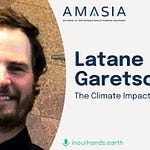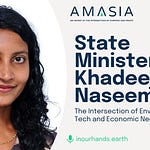In this episode of In Our Hands, Ramanan Raghavendran speaks with Lucas Joppa, Chief Sustainability Officer at Haveli Investments. They discuss his journey from environmental scientist to Microsoft’s first Chief Environmental Officer and transition to private equity. They explore the significance of sustainability in investments, the push for net-zero solutions, and the changing landscape of sustainable investing.
Click above for the full transcript. This episode is also available on Apple Podcasts and Spotify.
In Our Hands is a production of Amasia. Follow these links for more about our firm, the Amasia blog, our climate fiction podcast, and Ramanan’s blog.
Highlights
02:22 Sustainability in Private Equity
08:30 The Role of Technology in Sustainability
11:28 Innovative Solutions for Net Zero
15:27 AI's Impact on Energy Consumption
23:32 The Future of Sustainability and Investment
26:46 Looking Ahead: 50 Years into the Future











